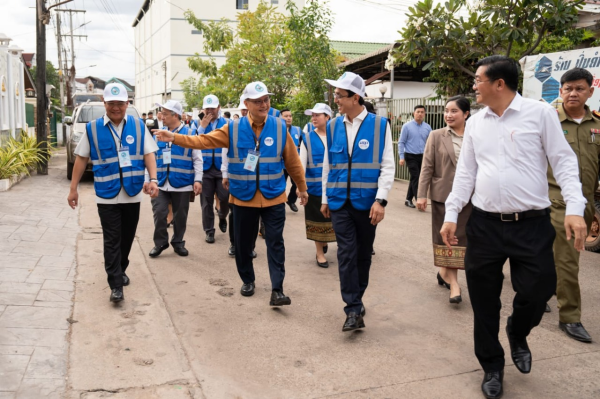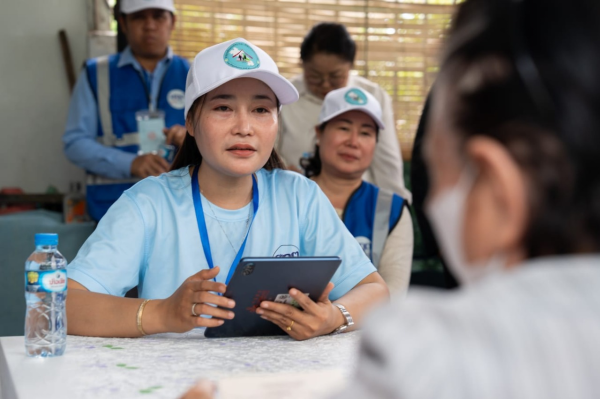KPL
Mr. Santiphab Phomvihane, Minister of Finance and Deputy Head of the National Steering Committee for the 2025 Population and Housing Census, led a field visit in Vientiane Capital on November 3, marking the official start of the nationwide data collection for the country’s first-ever digital census.

The visit was part of ongoing efforts to monitor and support the implementation of the census field operations, ensuring that data collection proceeds smoothly and effectively across all provinces.
Nationwide data collection for the 2025 Population and Housing Census will take place from November 3 to December 28, 2025, following the completion of training for more than 11,000 enumerators. These trained enumerators will be deployed across the country to collect data from all residents and households using handheld digital devices — including information from foreign nationals who have resided in the Lao PDR for six months or longer.
Joining the Minister were Mr. Athsaphangthong Siphandone, Mayor of Vientiane Capital; Mr. Visone Laomao, Deputy Head of the Lao Statistics Bureau (LSB); and Dr. Bakhtiyor Kadyrov, UNFPA Representative to the Lao PDR. The delegation was accompanied by officials from the Central Census Office and Vientiane Capital authorities during the visit to Chanthabouly District, marking the first day of field data collection.

The team met with local authorities to discuss potential challenges and ensure that necessary measures are in place to facilitate an efficient enumeration process. They also visited Sisavat and Thongtoum villages in Chanthabouly District to observe enumerators conducting household interviews as part of the nationwide census activity.
The 2025 Population and Housing Census will gather comprehensive data on the Lao PDR’s population — including its size, structure, growth, and distribution — as well as information on ethnicity, disability, housing conditions, education, and access to services. This data will provide the Government with an updated and accurate picture of living conditions across the country, highlighting both achievements and remaining challenges.
The census results will serve as a vital evidence base for developing and implementing effective policies and programmes. In particular, the data will support the monitoring of the 10th National Socio-Economic Development Plan (2026–2030), track progress toward the Sustainable Development Goals (SDGs), and strengthen strategies for empowering women, youth, and persons with disabilities.
During the visit, Minister Santiphab emphasized the importance of the census and called on capital and district-level census steering committees to ensure that enumerators can reach every household.

“Accurate data is fundamental to effective national development. When data is inaccurate, policies and plans risk being misaligned with the real needs and priorities of the people,” he stated.
Dr. Bakhtiyor Kadyrov highlighted that after four years of preparation, the nationwide field data collection phase had officially begun. He acknowledged the technical and financial support of UNFPA and development partners including DFAT Australia, the Swiss Agency for Development and Cooperation (SDC), Luxembourg, GIZ, the United States, and China Aid in enabling Lao PDR to conduct its first digital census.
“UNFPA is proud to be part of this national effort,” Dr. Kadyrov said. “Together with our partners, we will continue to provide support to ensure the success of this historic digital census. The census is not only about counting people — it’s about recognizing and empowering them, because behind every number is a person, a story, and a dream.”

Under the close guidance of the National Census Steering Committee and with technical support from UNFPA and development partners, the Lao Statistics Bureau began preparations for the 5th Population and Housing Census in 2021. The 2025 census marks a milestone as the first digital census in Lao history, setting a strong foundation for the modernization and digitalization of the national statistical system.
This digital approach will significantly improve data accuracy, timeliness, and accessibility, ensuring that the information collected serves as a powerful tool for evidence-based decision-making and sustainable national development.
KPL